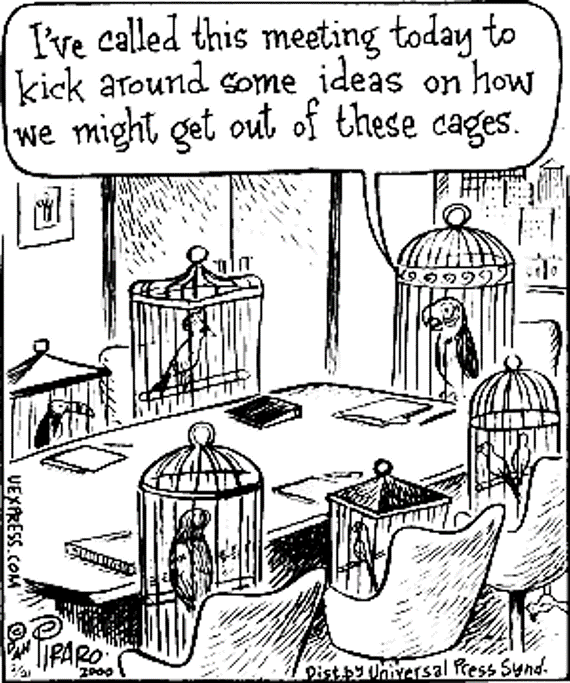Employees seeking empowerment.
There’s a new development under construction in my neighborhood and a big sign at the construction site advertises the new complex will include an “active adults” community. And every time I walk by I ponder how the phrase “active adults” means almost exactly the opposite of what the individual words signify; I’m anticipating that many not-particularly-active adults are already queuing up to lease or buy.
This has led me to reflect on several terms that appear almost every day in the business literature—terms I have grown to dislike and which usually end up meaning the opposite of what the words signify. So here’s a few of them.
EMPLOYEE EMPOWERMENT. Some of my favorite recent “headlines” on this topic (along with my parenthetical, snarky asides) include:
The Ultimate Starter Guide to Employee Empowerment (So you want to empower your employees, but don’t know where to begin…)
Don’t be Afraid to Give Employees Real Autonomy (I guess as opposed to fake autonomy.)
Corporate America’s New Flexible Dress Code is Indicative of a trend toward Employee Empowerment (I just don’t even know where to begin here!)
These headlines reveal what I think is the problem with the discussion around employee empowerment. Empowering the staff appears to be a tactic the manager/leader can use if they want. Rather than what I think it should be: a fundamental principle at work. Talking a lot about employee empowerment is a telltale sign that there isn’t any.
DIVERSITY AND INCLUSION. Aaargh!! Where to begin? I know that the usage of this term is often well-intentioned. Leaders recognize that just increasing the diversity of their staff is insufficient; they need to ensure that diverse voices have meaningful (equal?) impact in the workplace. But the use of the word inclusion is, I think, a mistake—actually counterproductive.
The use of the word “inclusion” just leads me to wonder how come I don’t naturally belong. Why does there have to be a “special” effort to include people who for whatever reason differ from the corporate norm? Why do we have a corporate norm in the first place? I can’t put it any better than Aubrey Blanche who wrote in a recent post that
Inclusion is like someone calling you saying: Hey, I am having a party and the people I wanted to come over are not joining, so you can come now. I am not interested in being included in spaces designed for specific groups of people who have no interest in what I can bring to the table.
COLLABORATION. I remember a young man I knew briefly in college—not well—who was agonizing over how to acquire “class.” I guess he suspected he was lacking in it (although I have no idea why he thought I might be helpful in this regard.) And all I could think (but not say) was that trying to think of ways to acquire class was itself kind of classless.
And that’s how I think about collaboration. Trying to make collaboration happen when it isn’t occurring naturally is not very collaborative. Adding steps to a process to “promote collaboration” doesn’t usually work; at best you get deconfliction, which is sadly what many organizations settle for.
Collaboration is a naturally-occurring phenomenon in healthy teams. An organization is likely to make more progress achieving collaboration by working on creating a positive and psychologically safe environment. You can design a process that requires Team A to coordinate with Team B on Issue Zed, but if the two teams don’t trust each other all you will get is box-checking.
Just some closing thoughts on a term I’ve grown tired of—LEADERSHIP—but not because it has an ambiguous or contradictory meaning. We all agree that individuals who are leaders are responsible for motivating the team, setting the vision, anticipating the future, solving cold fusion, and quantifying dark matter. And that’s the problem, isn’t it? Business, much more I think than other disciplines, still worships enthusiastically at the altar of the Great Man, and it is still usually a man. There are currently 27 female CEOs among S&P 500 companies; indeed, there are more men named Jeffrey than women.
I’m convinced the cult of leadership still does more to hinder rather than advance excellence in organizations. Or rather let me put it a different way. Every organization needs more people who behave like leaders. Leaving it up to one or two exalted individuals is just asking too much from flawed human beings. Each of us has the potential for an important contribution. So go and make it! Be an active adult!


